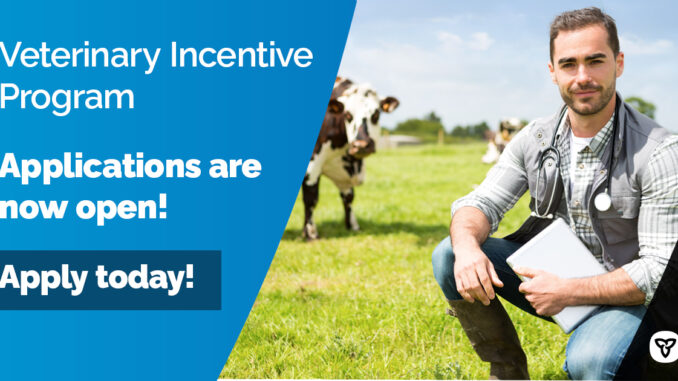
TORONTO — The Ontario government is launching the Veterinary Incentive Program to encourage newly licensed veterinarians to practice in northern and underserviced communities. The program intake opens today and will provide grants of up to $50,000 over five years to veterinarians who provide care to livestock and poultry in these communities.
“Veterinary services are a necessity for the agricultural community across Ontario, and our government recognizes the long-standing issues that farmers in underserviced areas have experienced when trying to access these services,” said Lisa Thompson, Minister of Agriculture, Food and Rural Affairs. “Through this initiative, we’re taking action to fix it. The Veterinary Incentive Program will ensure the sustainability and continued health of Ontario’s livestock sector.”
Ontario has launched the new Veterinary Incentive Program to encourage newly licensed veterinarians to work in underserviced areas.
Learn more: https://t.co/sDeVxGAYZ7 #OntAg @AdaptCouncil pic.twitter.com/5Z7c0PyiU1— Ontario Agriculture, Food and Rural Affairs (@OMAFRA) October 26, 2023
Through this program, up to 100 newly licensed veterinarians will be incentivized to provide specialized care to animals such as cattle, sheep, goats, and poultry in underserviced locations of the province. It is being delivered by the Agricultural Adaptation Council (AAC). Program details, eligibility requirements and information on how to apply will be available on the AAC website.
“Access to veterinary care is vital to ensure a prosperous Ontario livestock value chain, especially in underserviced areas,” said Doug Alexander, Chair, Agricultural Adaptation Council. “We are pleased to have been chosen to deliver this unique, timely incentive program for newly licensed veterinarians on behalf of OMAFRA.”
The Veterinary Incentive Program and the new Collaborative Doctor of Veterinary Medicine program were announced in the 2023 Budget, Building a Strong Ontario to help address the veterinary capacity shortage and attract new talent to veterinary medicine. This program is designed to make it easier for farmers and large animal owners to access veterinary care where and when they need it, encourage newly licensed veterinarians to find rewarding work, and open the door for veterinarians to practice in northern Ontario and rural communities.
“We know that access to care for livestock animals is critical to rural and northern communities,” said Jill Dunlop, Minister of Colleges and Universities. “By encouraging new veterinary graduates to practice in underserviced areas, the Veterinary Incentive Program will help address labour shortages head-on, connect highly skilled veterinarians to great careers and support local economic growth.”
This program builds on other measures the government has taken to increase access to veterinary care. In November 2022, the government launched consultations to explore opportunities to modernize the Veterinarians Act. A discussion paper on the proposed amendments was posted on the Regulatory Registry. Feedback received during the consultation period is now being reviewed and will inform possible changes to the Act in the future.
Quick Facts
- Increasing veterinary capacity is part of the Grow Ontario Strategy, the province’s plan to strengthen the agriculture and food sector, support economic growth and ensure an efficient, reliable and responsive food supply for Ontarians.
- Additional veterinary support for northern and rural communities includes the new Collaborative Doctor of Veterinary Medicine program, where students will spend two years at Lakehead University and two years at the University of Guelph in order to get hands-on experience working with livestock.
- The Agricultural Adaptation Council (AAC) is administering the Veterinary Incentive Program. Program guidelines and application forms can be found on the AAC website.
SOURCE Province of Ontario

Leave a Reply